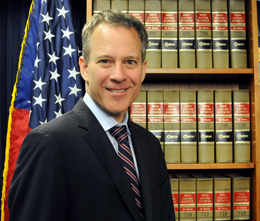 New Policy Aims To Ensure Inclusive, Respectful Workplace And Establishes Clear Guidelines For Supervisors And Other Staff
New Policy Aims To Ensure Inclusive, Respectful Workplace And Establishes Clear Guidelines For Supervisors And Other Staff
Attorney General Eric T. Schneiderman today attended Pride Day at the New York State Fair in Syracuse and announced that his office (OAG) has adopted policies supporting the right of employees to undergo a gender transition. The new policy, announced during the fair’s rainbow flag raising ceremony, explicitly affirms the right of employees to openly be who they are, including expressing gender identity, without fear of consequences. Employees are encouraged under the policy to work with a trusted supervisor, coworker, or Human Resources official to develop a Workplace Transition Plan. The policy requires supervisors, management, and coworkers to follow nondiscriminatory policies that support the transitioning individual, including through:
- Appearance Standards;
- Restroom Access;
- Pronoun And Name Changes;
- Name Changes On Professional Licenses And Registrations; and
- Rights To Privacy.
“Attracting and retaining top talent starts with creating a workplace that is inclusive and respectful,” said Attorney General Schneiderman. “This new policy affirms the basic rights and dignity of all of our office’s employees and will ensure a hospitable environment for our team of outstanding public servants.”
“It is great to see such leadership from state officials taking steps to make the workplace more inclusive and welcoming to transgender employees,” said M. Dru Levasseur, Director of the Transgender Rights Project at Lambda Legal. “These policies not only clarify existing legal protections, but also set a standard of respect and provide a model for the rest of the country.”
“This new policy is a clear and welcome plan helping ensure transgender state employees are able to work – and transition on the job – without fear of discrimination,” said JoDee Winterhof, Human Rights Campaign Senior Vice President for Policy and Political Affairs. “All New Yorkers, regardless of their gender identity, deserve to be able to live as their authentic selves and be treated respectfully in the workplace as they do so. Now thanks to the leadership of Attorney General Eric Schneiderman, his transgender employees have the peace of mind they need and deserve.”
Under the office policy, an employee may develop a Workplace Transition Plan that includes the following considerations:
- Identifying various stakeholders (e.g., supervisors, co-workers, clients, vendors, etc.) – who are all the people in the OAG you may need to engage at some point during the transition.
- A communication plan: when and how to inform the various stakeholders of your transition or intent to transition (e.g., a letter, a face-to-face meeting, individual discussions, your supervisor/HR explaining).
- The date on which you want to begin your transition at work. This is likely the point at which you will begin to present consistently with your gender identity, which may include change of name, pronouns, dress, grooming, and restroom use.
- The date on which OAG materials will be changed to reflect your transition (e.g., OAG directory, website, ID badge, email address, telephone listing, payroll information, etc.).
- The date on which your legal name change (if any) will take effect.
- Changes to external professional information (e.g., Lexis ID, bar and court registrations, ECF logins, bar association information, etc.).
- Any anticipated time off or leave required for medical treatment. Remember that the OAG’s normal sick pay and leave policies will apply.
- Identifying OAG benefits that are available to support the transition and affected by the transition.
- Are there any specific issues that need to be addressed sooner rather than later?
- Confirm who will be the OAG’s main point of contact (you or someone else from your Support Team) to manage the OAG’s involvement during the transition.
All employees remain subject to the Office of the Attorney General’s pre-existing Non-Discrimination and Anti-Harassment Policy. In addition to prohibiting various forms of work place discrimination, the policy also allows a transgender employee, regardless of whether or not they plan to medically or legally transition, to dress consistently with his or her gender identity. Any complaints or concerns raised by transitioning individuals or his/her co-workers will be handled consistent with the policy. The New York Attorney General’s Office relied on best practices from the transgender advocacy community in developing the policies issued today.
The full policy is available here.

